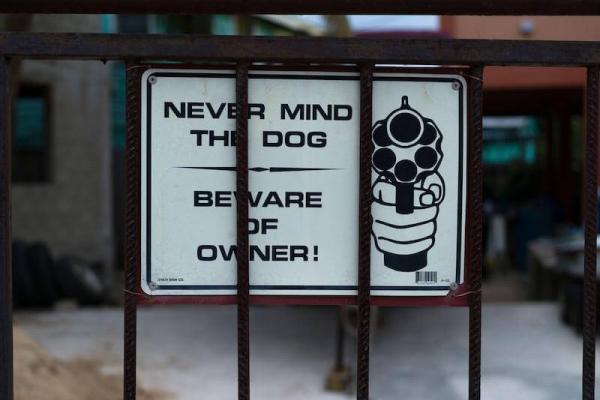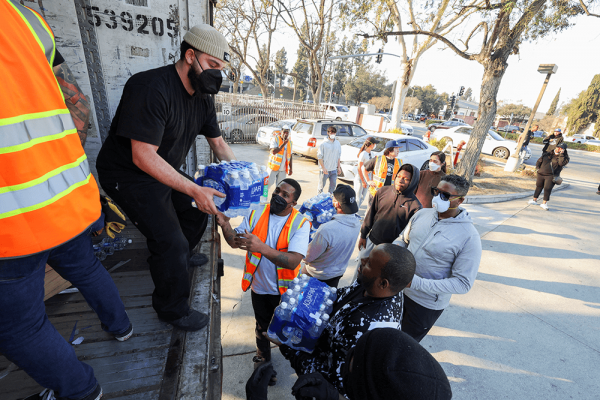In Kansas City, Mo., on April 13, 16-year-old Ralph Yarl, who is Black, was attempting to pick up his brothers but rang the wrong doorbell; Andrew Lester, the homeowner, shot and wounded Yarl. In Hebron, N.Y., on April 15, Kevin D. Monahan shot and killed 20-year-old Kaylin Gillis, who is white, when she and her friends accidentally pulled into his driveway.
Lester’s grandson, Klint Ludwig, told the Kansas City Star that his grandfather became immersed in conspiracies and disinformation, “a 24-hour news cycle of fear and paranoia.” He said Lester was influenced by “the [National Rifle Association] pushing the ‘stand your ground’ stuff and that you have to defend your home.”
Meanwhile, some Christian politicians like Oklahoma Sen. Nathan Dahm argue that more guns make us safer. Lester, a white man, told authorities that he shot Yarl out of fear for his own safety.
Writing for The DePaul Journal for Social Justice, lawyer Erika Wilson argues that the United States, built on a foundation of white supremacy and white nationalism, sees violence as a “right,” or an inevitable reality that guarantees us safety and freedom. “Race” and whiteness were concepts invented to justify European colonialism and the transatlantic slave trade. Wilson explains that property rights were governed by the “Doctrine of Discovery,” which stated that European Christians were the “rightful owners” of “new” lands.
In a nation built on white nationalism, keeping people fearful of the “other” is useful because it keeps up the illusion of law, order, and control — the foundations of white supremacy. Crime protection is now the dominant reason people own guns. Samuel Perry and Andrew Whitehead write in their book Taking America Back for God, that white Christian nationalists tend to want a strong military, capital punishment, and oppose gun control.
Yet again and again, Christians are commanded to welcome the stranger and be not afraid. “Do not neglect to show hospitality to strangers,” the author writes in Hebrews 13:2. “For by doing that some have entertained angels without knowing it.”
In the Hebrew Bible, there are 36 commands to welcome the stranger (versus only two to “love your neighbor”). The language of “stranger,” more so than “neighbor,” connotes someone who is totally other, unknown, and unfamiliar. Yet I’m called to welcome them unconditionally, without knowing their name, identity, or anything about them. The stranger is unassimilable and can’t be reduced to my knowledge of them (much like God).
One of the first Biblical stories of hospitality comes from Genesis 18, when Abraham and Sarah welcome three strangers in the desert who appear out of nowhere. Without knowing if these men are enemies or friends, Abraham — instead of reaching for a weapon or hiding in his tent — runs out to the visitors, bows before them, and rushes to provide them with a meal.
It turns out that God was in the midst of these strangers, appearing before Abraham to reveal that Sarah would have a child, assuring them that nothing is impossible with God. What if Abraham hadn’t practiced hospitality at this moment?
Welcoming the stranger is a choice and a risk, and yet it is God’s continuous command. Much political messaging in the U.S. is based on fear — that one’s freedom and security are being threatened by “outsiders.” Considering this, should we be surprised that the men who shot Yarl and Gillis did so out of fear? But for Christians, strangers should not instill fear in us but invite us to consider how to make the world a more just place.
The stranger in our midst demands that we pursue a justice that “seems to go beyond normal conventions of homeland security, which tend to exclude strangers, orphans and widows,” writes the philosopher Richard Kearney. In other words, the “freedom” and “security” that U.S. politics and society are centered around cannot carry out true justice. We have to think outside the logic of borders, property, and “the law.” We have to think in the direction of hospitality. The fact that God repeatedly commands God’s people to practice hospitality is “itself an acknowledgment that initial responses to aliens are more likely to be fear rather than love,” Kearney concludes.
When we are fearful and constantly bombarded with rhetoric based on scarcity and threat, it causes us to operate out of a sense of self-preservation. In 1968, Dorothy Day wrote about violent racism in the South and elsewhere during the civil rights movement.
“I know what human fear is and how often it keeps us from following our conscience,” she wrote. “We find so many ways of rationalizing our positions.”
Dahm’s statement that “guns make us safer” is gun propaganda that the NRA uses (Dahm received campaign money from the NRA and was endorsed by them). This messaging evokes “images of a society devoid of rule of law and under constant threat of attack from an unidentified but ever-present enemy,” writes Rukmani Bhatia, policy analyst for Gun Violence Prevention at the Center for American Progress. This is an exploitation and distortion of human fear in order to secure political power — emphasizing an “us vs. them” dynamic of “law-abiding citizens” vs. “lawless criminals,” vilifying those who work toward gun reform.
“Following the NRA’s logic,” Bhatia writes, “the only way law-abiding citizens can address these constant threats and keep themselves and their families safe is by possessing a firearm — a right enshrined in the Second Amendment.”
But while gun advocates fear for their property or their guns being taken away, there is a very legitimate fear of mass shootings and other forms of gun violence which have left a “cascade of trauma” among Americans. It is a fear that makes many, including me, anxious to go to movie theaters or music festivals, to school, or to the grocery store. Gun violence is now the leading cause of death for children and teenagers in the U.S. Fear of gun violence can lead to constantly being fearful of public spaces and people, severely impacting mental health.
Pope Francis said at a special Mass for World Day of Migrants and Refugees in 2018 that having doubts and fears “is not a sin.” The sin is to “allow these fears to determine our responses, to limit our choices, to compromise respect and generosity, to feed hostility and rejection. The sin is to refuse to encounter the other.”
To welcome the stranger goes against the logic of the nation-state and has radical implications for how we live on a daily basis. For the Jewish philosopher Emmanuel Levinas, the face of the other — the stranger — calls us into being and responsibility in a simple but radical way.
“The first word of the face is the ‘Thou shalt not kill.’ It is an order,” Levinas writes in Ethics and Infinity. “There is a commandment in the appearance of the face … I am he who finds the resources to respond to the call.”
This responsibility to the other precedes “freedom” or “the right to bear arms.” For Levinas, freedom becomes responsibility and that is the site of ethics and love.
Taking direct action in favor of common sense gun control and denouncing the sick addiction to the Second Amendment is one way to respond to the invitation to see the face of God in the stranger.
But advocating for gun control is exhausting and many people burn out or are cast out as pariahs. For example, on April 21, the Tennessee GOP cut their legislative session short with no steps or actions outlined for gun reform. This decision was made despite the cries among activists and communities in response to the recent school shooting in Nashville.
It’s in these discouraging moments that we can turn to God for help, asking for strength to continue the fight for justice and be nourished in the promise that God gave to Abraham after he entertained the strangers: Nothing is impossible with God.
In a nation-state that breeds fear, telling us to stockpile and own weapons, God is consistent in calling us to welcome the stranger and be not afraid. And so we long, in our guts, with the prophet Isaiah for weapons to become garden tools (2:4). Wherever the stranger is, there God is. This includes those who ring the wrong doorbells or pull into the wrong driveways. For “I was hungry and you gave me food, I was thirsty and you gave me drink,” Jesus says in (Matthew 25:31-40). “I was a stranger and you welcomed me.”
Got something to say about what you're reading? We value your feedback!







